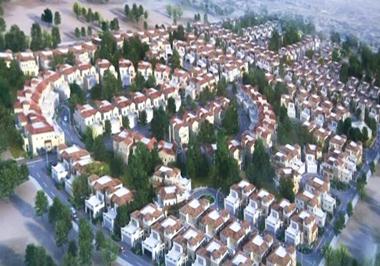More than six years after President Hamid Karzai first established plans for the Kabul New City (KNC) project, which seeks to expand the capital northward through a broad urban development initiative, the effort finds itself bedeviled by obstacles of both local and foreign origin.
Although plans for urban development in the Kabul Metropolitan Area (KMA) began years before, in 2006, President Karzai formalized the KNC project and charged and Independent Board for the Development of KNC with the task of developing a master plan. The plan that was created by the Board, which is comprised of public and private sector representatives from Afghanistan, Japan and France, set out to turn the Dehsabz and Barikab Districts into the New City by 2025. The ambitious plan looks to fuse public and private stakeholders and resources to construct a metropolis 1.5 times larger than the current city of Kabul, promising to expand employment, provide housing opportunities, increase government revenues and help assure the rehabilitation and development of the old Kabul.
Nevertheless, officials involved in the project have identified major and persistent obstacles to even just breaking ground, let alone completing the project on schedule.
Abdul Azim Mujadidi, the Chairman of Parliament's Commission on Monitoring Government Actions, called the NKC project one of the most important development efforts going on in Afghanistan, but he said malignant foreign powers as well as local opposition have been effective in derailing the project and preventing its implementation from being carried out as planned.
"The interference of neighboring countries and lack of awareness about the vitality of the project among the people are the central factors that have inhibited the implementation of the project," Mr. Mujadadi said. Although Mr. Mujadadi did not go into further detail about the interferences foreign elements have perpetrated, attacks against engineers and other project workers have been documented.
In other areas of the country, insurgent attacks on development initiatives are common. In July, the Shah and Aros hydroelectric dam construction site came under rocket attacks for three straight days. Earlier in the year, Salma dam project personnel were also the target of repeated attacks. Although no evidence has been produced to prove so, many have suggested Iran or Pakistan may be behind the disruptions.
The government pledged do all it can to combat malefactors that try to impede the NKC project.
"We will do our best to provide effective security for the project, and those who intend to challenge it will face legal action," said Mirza Moammad Yarmand, the Deputy Minister of Interior.
As Mujadadi noted, however, foreign elements and related security issues are not the only source of problems considered to be hampering the building of the New City. Residents of the areas in which the project plans designate for "clearance and acquisition" have not welcomed the initiative and organized active opposition.
Ghulam Sakhi Hassanzada, the Chief Executive of the NKC project, assured that awareness programs for the residents of the designated districts have been created and are beginning to make progress.
According to Mr. Hassanzada, a meeting was held with the residents of Dehsabz, Qarabagh, Shakardara and Kalakan Districts, who were raising concerns about the project, to settle the debate over land appropriate that was delaying the start of construction. He was confident about the success of the meeting and thought operations would get underway soon.
"Two months ago we were completely ready to start work on the project and we weren't able to, but now we are committed to begin," Mr. Hassanzada said.
In an exclusive interview with TOLOnews, however, representatives of Dehsabz residents claimed that landlords from their area were not present at the meeting with the NKC officials. They claimed that who attended the meeting were people who already favored the project and were brought there by the officials to feign a resolution to the disagreement.
"I am a Member of Parliament and one of the landlords in Dehsabz District, why didn't they ask me to participate in the meeting?" MP Allah Gul Mijahid asked. "I strongly believe that the project cannot be implemented unless current officials of the project are fired from their posts."
Construction of NKC was scheduled to begin back in June, but attacks on the engineers and resident demonstrations in Dehsabz stalled operations.
The NKC project is expected to take up 370,000 acres of land in Dehsabz, but officials purport that it would provide new housing to nearly three million Afghans along with a host of other economic benefits.



Comment this post